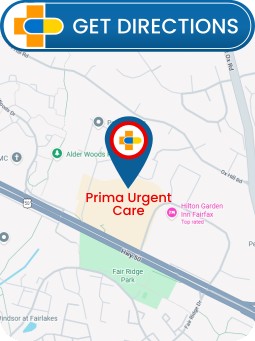Urgent Care for Allergy Treatment in Fairfax, VA
At Prima Urgent Care, we understand how disruptive allergies can be to your daily life. Our experienced medical team offers fast and effective allergy treatment to provide you with the relief you need. Whether you’re dealing with seasonal allergies, food allergies, or allergic reactions, our clinic is equipped to handle your needs promptly. For more information, contact us or schedule an appointment online. We are conveniently located at 3903 Fair Ridge Dr Suite Q, Fairfax, VA 22033.




Table of Contents:
What types of allergies can be treated at urgent care?
What symptoms indicate I should seek urgent care for an allergic reaction?
Can urgent care help with ongoing allergy management?
What should I bring with me to urgent care if I have an allergy?
Urgent care facilities, equipped with a dedicated team of healthcare practitioners, serve as a reliable destination for managing various allergic reactions that don’t pose an immediate threat to life yet necessitate prompt medical intervention. Here are the types of allergies effectively treated at these centers:
Seasonal Allergies (Hay Fever):
• Manifestations: Sneezing, nasal congestion or discharge, itchy or watery eyes
• Intervention: Prescription medications and guidance on minimizing allergen exposure
Food Allergies:
• Reactions: Mild to moderate symptoms such as hives, mild facial swelling, and digestive distress
• Note: Life-threatening reactions (anaphylaxis) require immediate emergency medical attention
• Therapy: Antihistamines and other symptom-alleviating medications
Skin Allergies:
• Expressions: Conditions like contact dermatitis, urticaria (hives), and eczema exacerbations
• Management: Topical treatments, oral antihistamines, or corticosteroids following thorough evaluation
Insect Sting/Bite Allergies:
• Symptoms: Localized swelling, redness, itching, and moderate discomfort
• Note: Severe reactions, including anaphylaxis, warrant immediate emergency care
• Treatment: Antihistamines and corticosteroids to mitigate symptoms
Drug Allergies:
• Reactions: Non-severe manifestations such as skin rashes, slight swelling, or hives
• Note: Life-threatening reactions affecting breathing demand emergency treatment
• Intervention: Medications tailored to managing symptoms
Contact Allergies:
• Etiology: Contact with substances like poison ivy, latex, or nickel
• Symptoms: Rashes, intense itching, blisters, or swelling
• Treatment: Topical and oral medications to control symptoms
Pet Allergies:
• Manifestations: Sneezing, itchy eyes, nasal congestion, and, occasionally, mild asthma symptoms
• Note: Severe asthma or anaphylaxis requires emergency care
• Therapy: Antihistamines and advice on symptom management
Mild Asthma Exacerbations:
• Symptoms: Asthma symptoms triggered by allergens
• Treatment: Inhalers, nebulizers, and other medications to manage symptoms
Urgent care facilities possess the resources to provide prompt relief through medications such as antihistamines, corticosteroids, and epinephrine for mild to moderate allergic reactions. However, it’s crucial to seek immediate emergency care for severe reactions like anaphylaxis.
Recognizing the severity of an allergic reaction can be paramount in averting life-threatening consequences. When confronted with the symptoms of an allergic reaction, understanding the critical indicators that warrant immediate medical attention is crucial. This will describe the telltale signs that demand urgent care or emergency intervention:
Short Breath:
• Difficulty breathing accompanied by labored breathing, wheezing, and a suffocating sensation.
Swelling:
• Pronounced swelling in the face, tongue, lips, or throat, potentially obstructing your airway.
Extensive Urticarial Afflictions:
• Large hives or a rapidly spreading rash, especially when combined with other severe symptoms.
Chest or Throat Constriction:
• A constricting sensation in the chest or throat, hindering respiration or swallowing.
Abnormal Cardiovascular Rhythm:
• Noticeably rapid or weakened pulse.
Disorientation:
• Lightheadedness, dizziness, or fainting, indicative of a drop in blood pressure.
Severe Gastric Distress:
• Vomiting, diarrhea, or abdominal cramps, particularly when coupled with other severe symptoms.
Mental Derangement:
• Confusion or loss of consciousness.
Anaphylaxis:
• A life-threatening allergic reaction characterized by a combination of the above symptoms, accompanied by anxiety or confusion.
Angioedema:
• Abrupt swelling in areas where skin interfaces with mucous membranes, such as lips, eyes, and mouth.
These symptoms could herald anaphylaxis—a severe allergic reaction that demands immediate medical intervention. Anaphylaxis can progress rapidly, so prompt action is essential.
If you are equipped with an epinephrine auto-injector (EpiPen), administer it promptly upon experiencing severe symptoms. Subsequently, seek emergency medical assistance without delay.
For milder allergic reactions, such as localized hives, itching, or minor swelling, consult your healthcare provider for guidance. Visit an urgent care center if symptoms intensify or persist despite over-the-counter treatments.
Always prioritize caution when encountering allergic reactions, as they can escalate swiftly. Seek urgent care if you encounter:
• Hives or a large rash covering most of the body.
• Swelling or itching that persists for more than 24 hours.
• Breathing difficulties or wheezing that worsen or defy over-the-counter medications.
• A history of severe allergic reactions.
By promptly addressing these symptoms, you can safeguard your well-being and prevent life-threatening complications.
Urgent care centers serve as a safety net for acute allergic episodes, offering prompt attention to non-life-threatening allergic reactions like hives, asthma flares, and sudden allergy symptoms. They can provide immediate treatments such as antihistamines, decongestants, and corticosteroids to alleviate discomfort.
While urgent care facilities offer valuable assistance during allergic emergencies, they are not equipped for comprehensive allergy management. They lack the specialized equipment and expertise required for thorough allergy testing and advanced treatments like immunotherapy.
For in-depth allergy evaluations and tailored long-term treatment plans, consulting a specialist (allergist or immunologist) is essential. These experts possess the knowledge and resources to conduct comprehensive allergy tests, devise personalized treatment strategies, and prescribe medications such as antihistamines, nasal corticosteroids, and allergy shots.
When an allergic reaction strikes, time is of the essence. Equipping yourself with this comprehensive toolkit will transform your urgent care visit into an empowering experience:
Identification and Insurance:
• Photo ID: Proof of your identity.
• Health Insurance Card: Essential for coverage.
Medical History:
• Allergy Summary: Details of your allergy, reactions, and treatments.
• List of Allergens: Pinpoint your triggers and their consequences.
• Current Medications: All prescribed and over-the-counter remedies.
Allergy Essentials:
• Prescribed Allergy Medications: Antihistamines, inhalers, or epinephrine auto-injectors.
• Emergency Contacts: Names and numbers of trusted individuals.
Exposure Information:
• Recent Exposure Timeline: Identify potential allergy triggers in food, environment, or products.
Timeline of Symptoms:
• Symptom Diary: Track the onset, progression, and severity of your allergic reaction.
Medical Documentation:
• Relevant Medical Records: Allergy test results and past treatment records.
By presenting this toolkit to the urgent care providers, you empower them to make informed decisions and provide the best possible care for your allergic reaction. Remember, every item you bring contributes to a smoother, more effective visit.
Don’t let allergies hold you back. At Prima Urgent Care, we are dedicated to helping you find relief quickly and efficiently. Our compassionate team is here to address your symptoms and provide personalized care tailored to your needs. Visit us today for immediate allergy treatment and experience the comfort of breathing easier. Prima Urgent Care – your trusted partner in health. We serve patients from Fairfax VA, South Riding VA, Dulles VA, Chantilly VA, Stone Ridge VA, Oakton VA, Burke VA, Oak Hill VA, Lees Corner VA and beyond!

Check Out Our 5 Star Reviews


Additional Services You May Like

Additional Services You May Like
- Urgent Care
- COVID Testing
- Lab Testing
- X-Rays
- Illness
- Injuries
- Immediate Care
- Employment Physicals
- Allergies
- Flu
- Fever
- Broken Bones
- Kidney Stones
- Hormone Replacement
- DOT Physical Exams
- Drug Testing
- Gonorrhea
- Sports Physicals
- School Physicals
- Sexual Infection
- Vomiting
- Erectile Dysfunction (ED) Treatment
- Vaginal Infection
- Abscesses Skin Infections
- Acute Fracture
- Ankle Sprain
- Back Pain
- Bladder Infection
- Ear Infection
- Eye Infections Styes
- Hemorrhoids
- Knee Sprain
- IV Therapy
- Immigration Physicals
- Minor Dislocation
- Neuropathy Treatments
- Psychiatric Services (Depression/Anxiety)
- Shoulder Pain
- Sinus Infections
- Stomach Flu (Gastroenteritis)
- Strep and Sore Throat
- Auto-Accidents
- Vision Testing
- Pre Op Physicals
- Medical Weight Loss
- More Services



